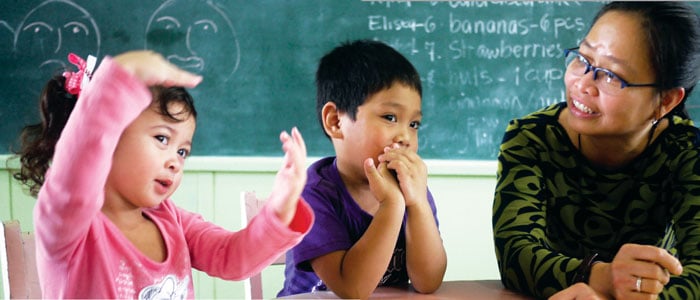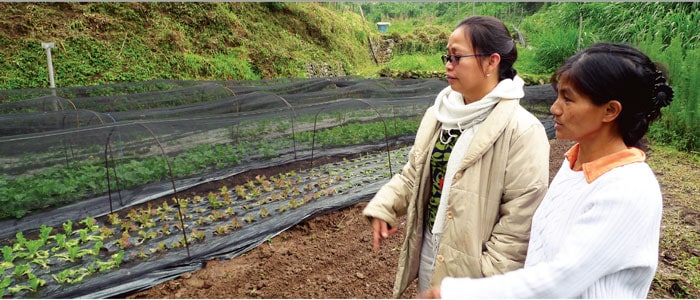Maryknoll Sisters in northern Philippines draw on science and faith to educate people to the wonders of creation
In a remote spot in the Pacific, on a mountain surrounded by pine trees some 5,000 feet above sea level, the sun sets with resplendent beauty behind cottony billows of saffron-colored clouds. No wonder the Maryknoll Sisters, arriving here in Baguio, Philippines, in 1920, fell in love with the place and decided to build a convent and retreat house for nuns needing to rest and recharge from their teaching ministries in the capital, Manila. It wasn’t long, though, before it was apparent Baguio also needed teachers.
“The people from around the area asked the Sisters to set up Catholic education here,” says Maryknoll Sister Lourdes Catherine Encarnación.
In response to this request, the Sisters’ retreat house was turned into a primary school in 1928 and remained in continuous classroom use until 1990, when the building was destroyed in the 7.8 magnitude Luzon earthquake. After the devastating temblor, the Sisters reflected on the destruction, asking themselves what God’s message was and what this meant for their ministries. Since there were by then other schools in the area, they recognized the people no longer needed them as grade-school teachers.
As they looked at the place that had been like paradise, the Sisters saw the encroaching deforestation of the unique Luzon tropical pine forest, which was traditionally harvest-ed for lumber, firewood and turpentine and was now being burned off for agriculture and mining projects. They decided to refocus their work on teaching the local people and others about caring for the environment, says Sister Encarnación.
They founded the Maryknoll Sisters‘ Center for Justice, Peace and Integrity of Creation, an ecological sanctuary of 2.8 hectares of pine forest, gardens and an area dedicated to biodynamic cultivation whose principal objective is to offer educational activities about taking care of the earth. Emphasis is placed on an artistic and spiritual approach to the topic of caring for God’s creation.

Wide world At the center where she is director, Sister Catherine Encarnación minds to the wonders of the universe. (Sean Sprague/Philippines)
The center, founded by Maryknoll Sister Ann Braudis in 1993, brings the Sisters’ work in this part of the Philippines full circle, again turning the spot on the northern island of Luzon into a retreat center where up to 60 people can gather for reflection, seminars and workshops. The center includes a daycare where children ages 3 to 5 learn to plant trees and appreciate the wonder of nature. The garden sanctuary is arranged with a 14-station trail designed to allow visitors to reflect on the breadth and depth of God’s universe. Known as the “Cosmic Journey,” the walk is a key part of the Maryknoll Ecological Sanctuary and is described as “a nature walk of play and discovery into the earth’ s deep interconnectedness.” The stations were created to portray “the magnificence of the unfolding of the cosmos.” The first station is about the creation of the universe and then the geological and biological formation of earth, followed by ones chronicling the arrival of the mammals and then primates, while the last two portray the earth’s religious traditions.
“When people visit the sanctuary, they have an experience of the development of the universe and creation,” says Sister Encarnación, the director of the center, who was educated by the Maryknoll Sisters in the Philippines and took her final vows as a Sister in 2004. She served in a similar ecological mission in Panama.
For the Philippine native, her current mission combines her respect for indigenous cultures and love of nature and creation with her faith and love of God.
Maryknoll Sister Margarita Jamias, who is also from the Philippines, oversees the educational programs at the center. “I was amazed when I saw this place,” says Sister Jamias, whose previous missions in Guatemala and Nicaragua were also focused on education. “I worked with base Christian communities and accompanied the people, especially the women, in their struggles,” she says.
Her current work in the ecological sanctuary in Baguio has increased her sense of mission, Sister Jamias says. “My vision has changed. We do not talk only of social justice but of an ecojustice, which means justice for all species.”
That means working in a holistic manner in social justice, human rights and protection of natural resources. “Mining is consuming the resources of the Philippines,” she says. “Big companies poison the rivers and don’t clean them up. What are we doing to the birds, to the fish? We are contaminating the very seeds. We clear the trees and leave all the creatures without habitat.”

Garden grows Sister Catherine Encarnación and co-worker examine the bio-dynamic farming demonstration plot, where they teach holistic care of earth. (Sean Sprague/Philippines)
Only 3 percent of the Philippines’ virgin forest remains, compared with what existed at the start of the 20th century, she says. That is why the work of the center to raise awareness of the damage being done to the natural environment and increase appreciation for the beauty of nature is so important, she says, adding that people’s thinking about caring for the environment has to change.
“We have severe weather conditions, floods and land-slides because of lumbering,” Jamias says. “We can replant trees but it will never really be the same; it’s an irreplaceable resource.”
Through the “Cosmic Journey” and drawing on science and faith, the Maryknoll Sisters hope to change hearts and minds about caring for creation, especially for the younger generation.
“I awake in the morning, meditate and pray, listen to the birds and observe the sunrise,” Sister Jamias says. “I feel the presence of God. All is a manifestation of the divine.”
For a video related to this article, visit www.maryknollmaga-zine.org
Listen to Maryknoll’s radio program, Voices of Our World, for an audio interview with the Sisters in Baguio: http://www. voicesofourworld.org
Featured image: Center of life Sister Margarita Jamias outside the ecological sanctuary in Baguio, where she oversees educational programs on care of creation. (Sean Sprague/Philippines)

